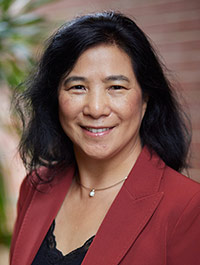Annual lecture

The annual lecture in computer science is held on the UNB Fredericton campus. It was established through the generosity of Dr. Colin Ware.
Colin Ware was a professor in the UNB Faculty of Computer Science from 1985 until 1999. During this period Colin co-founded two companies and developed the Fledermaus 3-dimensional geospatial visualization system that is widely used today in oceanography. In 1999, Colin requested that all royalties from his share of the Fledermaus agreement with UNB be transferred to the Faculty of Computer Science for the purpose of funding an annual lecture series.
Into the Digital World: Affordances and Scaffolds in Support of Learning
Dec. 11, 3 p.m.
Gillin Hall 122
Enter at 550 Windsor St.
ITC Building and signage will guide you to the room
Join us for the annual computer science lecture, featuring guest speaker Dr. Xun Ge, the first UNB Fulbright Canada Research Chair in Digital Transformation and funded by the McKenna Institute.
Dr. Ge will explore the concepts of affordances—the unique attributes and capabilities offered by digital environments. Attendees will gain insights into the role of scaffolding—providing just-in-time support when needed. The presentation will showcase examples from digital games and immersive virtual reality, illustrating how digital affordances and scaffolding tools synergize to create rich and effective technology-supported learning environments.
For more information, contact Patricia Evans at pevans@unb.ca.
Guest speaker
Dr. Xun Ge

Dr. Xun Ge is the first Fulbright Canada Research Chair in Digital Transformation at UNB. She is collaborating with the faculty of computer science, the Human-Computer Interaction Lab and the Spatial Computing Training and Research Lab, on projects involving virtual reality and robots.
Dr. Ge is an accomplished scholar in learning Design and technologies and a professor and incoming chair in the department of learning technologies at the University of North Texas. In recent years, she has been working to expand her expertise in learning sciences, learning technologies, and instructional design to the realms of extended reality and artificial intelligence, in hopes of advancing theories and research in learner experience design and technology. She aspires to continuously improve learning and instruction in various educational and training settings through designing technology-supported learning environments, developing innovative learning technologies, and engaging in interdisciplinary research.
Dr. Ge received her Ph.D. in Instructional Systems from Pennsylvania State University. Prior to joining the University of North Texas, she was a professor of learning sciences in the department of educational psychology at the University of Oklahoma, where she served as a department chair for four and a half years.
Dr. Ge has been pursuing lines of research in ill-structured problem-solving, scaffolding, and designing technology-supported learning environments, which intersects cognition, motivation, design, development, and assessment. Her publications have been well- cited and widely recognized in the field of learning design and technology.
Dr. Ge has won numerous awards and honors from her field, including “Distinguished Development Award,” “Outstanding Journal Article Award,” “Book Award,” and “Young Scholar Award.”
Dr. Ge is the Past President of Association for Educational Communications and Technology (AECT) and the Co-Editor of the Interdisciplinary Journal of Problem-based Learning. In addition, she has also been serving on the editorial board of several top-tier journals, such as Contemporary Educational Psychology, Educational Technology Research & Development, Instructional Science, Technology, Knowledge, and Learning, and The Internet and Higher Education. Currently, she is co-editing a special issue on “Educational Design Research for Human Beings’ Learning Access – Centering Accessibility, Equity, and Inclusion” for Educational Technology & Society.
Past lecture
2022 | Why Computing Belongs Within the Social Sciences
Randy Connolly, Professor of Mathematics & Computing at Mount Royal University in Calgary, Alberta presents the 2022 lecture.
Lecture abstract
Computer Science faces a gap between its desire to do good and the sometimes harmful effects of its interventions. As such, it is important for higher-education computing programs to do more than simply add in ethics instruction or codes of conduct into their curricula. The remedy to these ills lies less in philosophy and more in fields such as sociology, psychology, anthropology, and political science. That is, because computing is entangled within the human and social lifeworld, computing as an academic discipline needs to move away from engineering-inspired curricular models and integrate the analytic lenses supplied by social science theories and methodologies. This presentation is an extension of Connolly's Communications of the ACM article, "Why Computing Belongs Within the Social Sciences," which has been downloaded over 44000 times since its publication in August 2020.
Bio
Randy Connolly is a Professor of Mathematics & Computing at Mount Royal University in Calgary, Canada. His teaching specialties are web development and technology and society studies. His research has oscillated between his two backgrounds of computer science and political science, and includes the teaching of web development, the general pedagogy of computing education, and the social effects of computing.
He is the author of five books, the most recent of which is Fundamentals of Web Development, Third Edition, used by thousands of students annually at hundreds of universities worldwide, and Computing Careers & Disciplines: A Quick Guide for Prospective Students and Career Advisors. He is a long-time editorial board member for both ACM Transactions on Computing Education and ACM Inroads.
